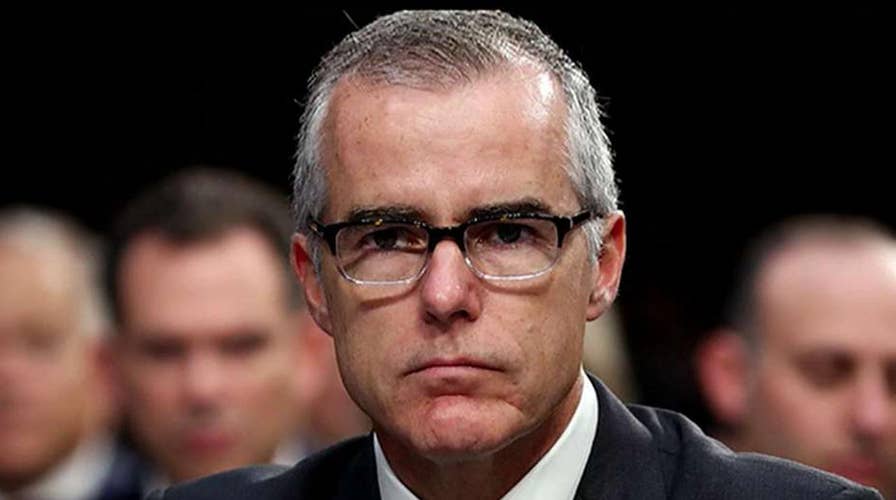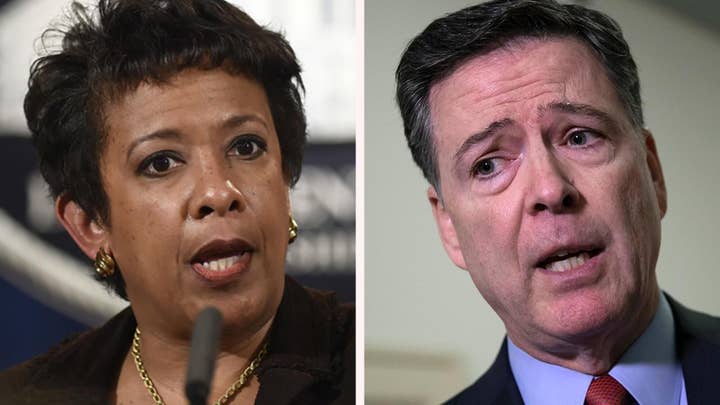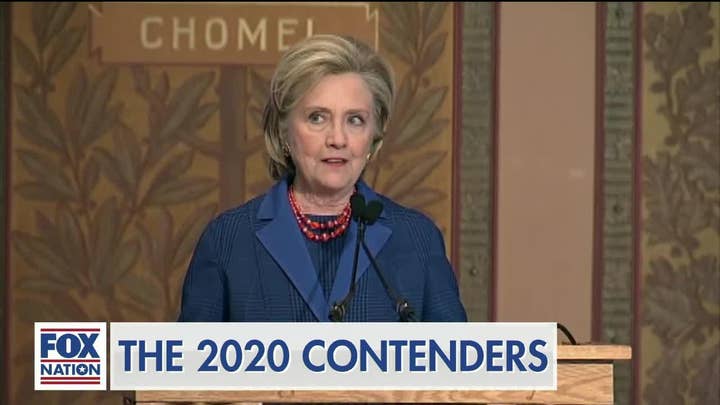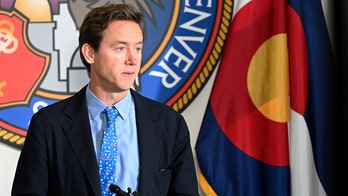Former FBI deputy director Andrew McCabe, in his new book, rails against President Obama’s attorney general, Loretta Lynch, for her decisions and actions while the FBI investigated Hillary Clinton’s email server during the 2016 campaign, saying Lynch should have been recused from the probe and a special counsel should have been appointed instead.
McCabe wrote in “The Threat,” released Tuesday, that “the tarmac meeting was a horrible lapse in judgment by Loretta Lynch.”
Lynch came under fire in 2016 after an infamous tarmac meeting with former President Bill Clinton days before the FBI decided it would not recommend criminal charges against his wife for her handling of classified information on her private email server. Lynch, reacting to the criticism for meeting with Clinton while the FBI investigated his wife, has claimed she and Clinton only discussed “innocuous things.”
TRUMP DENIES CALLING ANDREW MCCABE'S WIFE ‘A LOSER’
But McCabe said Lynch, after the outcry over the meeting, should have stepped away from the probe – which was code-named "Midyear Exam" by the FBI.
“She should have recused herself from Midyear at that point,” McCabe wrote. “She did not—she made things worse.”
McCabe suggested things would have turned out better had Lynch and Deputy Attorney General Sally Yates, both appointed by Obama, recused themselves even earlier from the case.
“It was a fatal choice. Had there been a competent, credible special counsel running Midyear Exam independently—the way Bob Mueller’s Russia investigation has been run – I think circumstances might have been very different, and we would not have been where we ended up in July,” McCabe said.
That's in apparent reference to when then-FBI Director James Comey came under heavy criticism during the campaign for his choice to make a public announcement explaining why Clinton was not being charged. He later explained he felt compelled to take the lead on the announcement because of the questions over Lynch’s credibility.
McCabe argued that for Lynch and Yates, “Recusal would have been a reasonable and, I would argue, better decision for those political appointees to have made." He added, "I don’t know why they didn’t do that.”
“Somehow, they saw the investigation of Hillary Clinton – former first lady and former secretary of state, current candidate for the presidency, likely nominee of the Democratic Party, who was being supported by the president of the United States, to whom they owed their jobs – as a case they could handle without prejudice,” McCabe wrote.
MCCABE: 'NO ONE' IN CONGRESSIONAL LEADERSHIP OBJECTED WHEN TOLD OF FBI’S TRUMP PROBE
McCabe also said FBI agents mocked Lynch’s insistence to Comey to characterize the probe as a “matter” instead of an “investigation” – an apparent attempt to downplay the seriousness of it.
“This became a running joke whenever anyone at the FBI felt like Justice was dragging its feet,” McCabe wrote. He said agents would joke, “What have we become, the Federal Bureau of Matters?”
Still, McCabe said Comey was concerned about it.
“The matter of the ‘matter’ did have a serious effect on the director,” McCabe said. “It planted the question, Was the attorney general trying to minimize what we were doing? The question festered. He’d heard that the Clinton campaign was trying to avoid the word ‘investigation,’ too.”
Like Lynch, McCabe’s involvement in the Clinton case has also come under scrutiny. Trump himself has suggested McCabe was in the tank for the Clintons, drawing attention to how McCabe’s wife, Jill McCabe, received donations from Virginia Gov. Terry McAuliffe's super PAC while she ran for a state Senate seat in Virginia in 2015. McAuliffe is a close Clinton ally. McCabe did not recuse himself from the Clinton investigation until a week before the election.
MEGHAN MCCAIN STUNS ANDREW MCCABE ON 'THE VIEW,' ASKS IF HE WAS NEW YORK TIMES LEAKER
In the book, McCabe denied a conflict of interest, and dismisses the accusations as a “conspiracy theory.”
McCabe was eventually fired last year by then-Attorney General Jeff Sessions after an inspector general report said McCabe lied about leaking to reporters about the Clinton investigation. He defended himself, but declined to write much about that episode, citing legal reasons.
“As for my own firing and the ostensible reasons behind it, the demands and risks of an ongoing legal process put tight constraints on what I can say, although I would like to say much more,” McCabe said. “I am filing a suit that challenges my firing and the IG’s process and findings, and the unprecedented way DOJ handled my termination. I will let that action speak for itself.”






